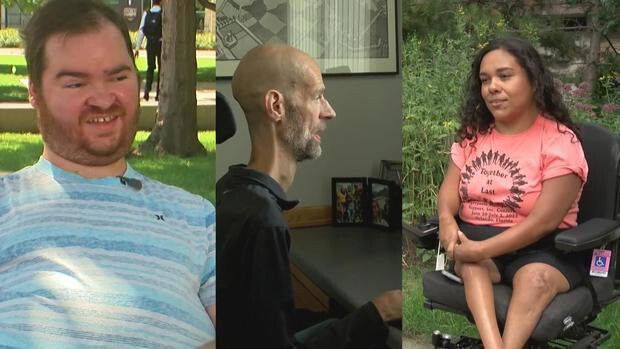Minnesotans with disabilities say state laws restrict financial freedom

A.J. Kreig
By SUSAN-ELIZABETH LITTLEFIELD
Click here for updates on this story
MINNEAPOLIS (WCCO) — Imagine going to school, getting a professional degree, then not being able to use that degree because it actually pays too much money. That’s what some Minnesotans with physical disabilities say is their reality.
To understand their stories, you have to understand how they began.
“I have spinal muscular atrophy, type two,” A.J. Kreig said. “I’ve been in a wheelchair since I was 4.”
“So I have spinal muscular atrophy,” Damon Leivestad said. “I walked until I was about 10 years old and then transitioned to a manual wheelchair. It gets the job done.”
Leivestad studied mechanical engineering. He has strong work ethic, but parts of his body are weak, so he has 24-hour care.
His friend Kreig graduated from the University of Minnesota in 2013, but he doesn’t have the full-time career he had envisioned. He said despite his degree, he can’t make the money he deserves.
Kreig requires $67,000 in personal care assistance a year. PCAs help him get out of bed, clean up and get dressed every day. Right now, the state fully covers Kreig’s services, but in order to keep them, he has to make $1,113 or less per month. That’s the poverty line.
“We have to kind of sacrifice our financial lives,” he said.
Leivestad says his care is about $100,000 a year. He’s pretty frustrated with most lawmakers.
“I just don’t think they really understand how difficult it is to work when you’re disabled. In order to be on medical assistance, you have to be very asset poor, so you can’t have a whole lot of assets,” he said.
Leivestad said for him to work and cover his own care, he would need to make about $200,000 a year. So he chooses to work just a few hours a week and get full PCA benefits.
Brittanie Wilson, who also uses PCA support, knows this from a personal and professional perspective. She works for the Minnesota Council on Disability.
“I mean, it’s devastating, right? Because the world is losing out on so much potential and on so much progress forward,” Wilson said.
She is choosing to work full time.
“I know for myself, working and earning competitive wages has given me meaning in my life. It’s a reason to get up in the morning, you know?” she said.
Wilson is on a program where she can still get services but has to pay premiums. She can save no more than $20,000 at any time and has to fully disclose finances every six months. She said the program is complicated and takes persistence.
“So if you don’t have those skills, that knowledge and that understanding and a way to navigate these pathways, that can be a really big barrier,” she said.
She said the program needs to allow people with disabilities who want to work to save money without limits to buy a house. She said she’s not alone.
“There just needs to be a lot better communication and a lot more effort by state and federal government to see people with physical disabilities as real people. Like we could offer a lot more if we had more freedom,” Kreig said.
So just like Leivestad, Kreig will continue working part time and hopes one day he can realize his full career potential.
“When there’s systems and barriers put in place that stop perfectly capable people from being able to live the life that they want and support themselves, it’s devastating,” Wilson said.
Now, the trio we interviewed agreed it’s time for a shake up in these guidelines. They hope that lawmakers pay attention and help out. They also say this is related to the PCA shortage.
Please note: This content carries a strict local market embargo. If you share the same market as the contributor of this article, you may not use it on any platform.